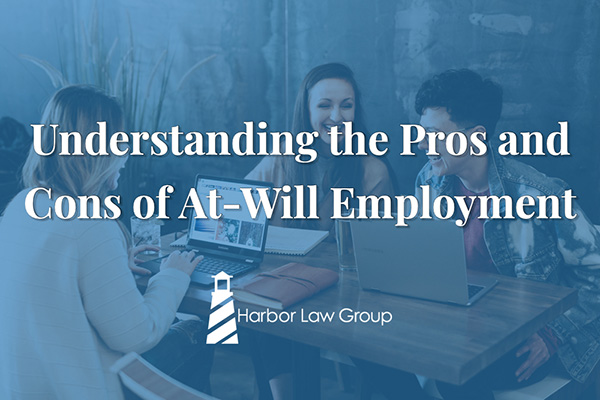Employment at Will: Pros and Cons
At-will employment is a legal fact of life in numerous states, including California and Washington, where I am licensed. Understanding this concept can help business owners maintain compliance with these laws and avoid costly legal battles.
The legal requirements behind this concept change constantly, increasing your chances of eventually making an unintended misstep. Consulting a Washington employment law attorney can help ensure that you conduct all employment-related aspects of your business within the bounds of the law.

What Is Employment at Will?
In short, employment at will means an employee can quit or be fired at any time, for any reason whatsoever (other than an illegal reason…more on that later).
Although an employment contract spelling out the details of the employment absolutely should be used in every employment arrangement, employment is also at-will even without a contract. (Although, please, please remember to always identify that your employee is “at-will” in the employment agreement.)
What Are the Advantages of Employment at Will?
The primary advantage of having at-will employees is that if and when you need to do so, you can terminate an employee at any time without having to provide justification.
Every employer knows that sometimes, an employee simply is not a good fit with the culture of the organization. Many business owners believe that they should have the right to fire employees without having to give them a reason. The good news is that you can legally terminate an employee at will in Washington or California State as long as your actions don’t violate the law (e.g. harrassment, discrimination against a protected class of people, whistle blower actions, and the like).
What Are the Disadvantages of Employment at Will?
One of the most common disadvantages that employers encounter under this arrangement is that your employees can quit at any time, for any reason. This can leave you short-handed or without anyone who is qualified to handle those job duties. Hiring and training new employees is expensive and time-consuming, and this scenario could potentially cause other problems for your business.
A more pressing concern, however, is that you might have to defend yourself and your business if a terminated employee takes legal action. Former employees could assert that you discriminated against them or that you fired them in retaliation for their prior actions, even if that’s not true. Although this is true in every state, it is especially true in California where the laws are far more strict. For example, an aggrieved employee can sue both the business and the business owner (without piercing the corporate veil), and get their attorneys fees if they are successful!
Even if the court finds that you did not violate the law or discriminate against the employee, becoming embroiled in any legal action can be incredibly costly and time-consuming.
Beware of These Employment at Will Exceptions
Although you might assume that you have an at-will arrangement with your employees, some potential pitfalls could pose a legal risk to you and your business.
One common exception to at-will employment is an implied employment contract. If an employee reasonably believes that they have entered into an implied contract with you as their employer, it could lead to problems if you need to terminate the employee. Your company policy manual, for example, could set this type of expectation for employees, based on its contents and verbiage. Beware of this pitfall!
Even if you do have a valid at-will arrangement with your employees, you can’t terminate them for an illegal reason. For example, you cannot terminate an employee to avoid giving them their retirement benefits. You cannot fire someone for exercising a legally protected right, such as reporting harassment or asking for a disability accommodation. You also cannot terminate an employee for any reason that violates federal or state laws, e.g., the Fair Labor Standards Act, Family and Medical Leave Act, Civil Rights Act, etc.
Other exceptions could apply to your specific industry and depending on the state in which the employee lives. An experienced employment attorney can help you identify any potential legal challenges and ensure you remain compliant in all of your activities, including hiring, compensation, and termination.
Finally, you should also be aware that, under Washington State law, you must provide a terminated at-will employee with your reason(s) for firing them if they present you with a written request to do so.
Talk to an Employment Attorney for Help
The Harbor Law Group, located in Gig Harbor, Washington, assists clients throughout Washington and California State. Our experienced firm provides affordable legal services with a highly personalized approach.
Contact us now to learn more about how employment at will might affect your business or for assistance with any type of employment issue in Washington or California State.



